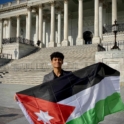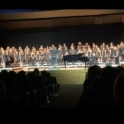Maryame has taken the lessons learned from her exchange year to make a difference in her community.
STORIES
Tanks, Jets or Scholarships?
This article was originally published in the New York Times on May 1, 2012.
Written by <a href="http://topics.nytimes.com/top/opinion/editorialsandoped/oped/columnists/thomaslfriedman/index.html?inline=nyt-per" title="More Articles by Thomas L. Friedman">THOMAS L. FRIEDMAN</a></p>
And so it came to pass that in 2012 — a year after the Arab awakening erupted — the United States made two financial commitments to the Arab world that each began with the numbers 1 and 3.
It gave Egypt’s military $1.3 billion worth of tanks and fighter jets, and it gave Lebanese public-school students a $13.5 million merit-based college scholarship program that is currently putting 117 Lebanese kids through local American-style colleges that promote tolerance, gender and social equality, and critical thinking. I’ve recently been to Egypt, and I’ve just been to Lebanon, and I can safely report this: The $13.5 million in full scholarships has already bought America so much more friendship and stability than the $1.3 billion in tanks and fighter jets ever will.
So how about we stop being stupid? How about we stop sending planes and tanks to a country where half the women and a quarter of the men can’t read, and start sending scholarships instead?
I am on a swing through the Arab world right now, and I am spending as much time as I can with public schoolteachers and students — and young Arabs doing technology start-ups — and as little time as possible with officials. It derives from my conviction about what really propelled the Tunis and Tahrir Square revolutions: Arab youths — 70 percent of this region is under 30 — who were humiliated and frustrated that they were being left behind. This Arab awakening was their way of saying: We want the freedom, the voice, the educational tools, the jobs and the uncorrupted government to realize our full potential. That’s what sparked this revolution.
Yes, the various Muslim Brotherhoods have exploited the opening created by these uprisings because they were the most organized parties. But if the Islamists don’t respond to the real drivers of this revolution — that yearning for education and jobs and the dignity they bring — they, too, will eventually face a rebellion.
If America wants to connect with the real aspirations of these revolutions, it will expand to other Arab awakening countries the $13.5 million U.S. Agency for International Development scholarship program begun in Lebanon. And, by the way, hats off to President Obama, Secretary of State Hillary Clinton, the USAID Administrator Rajiv Shah and the members of Congress who got this program going.
Iran is building dams and roads around Lebanon, decorated with “Thank You, Iran” signs. But no one is standing in line here to go to Tehran University. They still line up for American scholarships, though — one requirement of which is that winners have to do community service, so we are also helping to build better citizens.
The American Embassy in Beirut introduced me to four of this year’s Lebanese scholarship students — who attend either the Lebanese Arab University or Haigazian University, which offer modern U.S.-style bachelor’s degrees.
Israa Yassin, 18, from the village of Qab Elias, who is studying computer science, told me: “This whole program is helping to make the youth capable of transforming this country into what it should be and can be. We are good, and we have the capabilities and we can do a lot, but we don’t get the chance. My brother just finished high school, and he could not afford [university]. His future is really stopped. The U.S. is giving us a chance to make a difference. I do believe if we are given the chance, we can excel. ... We will not be underestimated anymore. It is really sad when you see a whole generation in Lebanese villages — hundreds of guys doing nothing — no work, not going to college.”
After getting the U.S. scholarship, said Yassin, “my family and my community feel differently about America. Why would they hate someone who is helping them?”
Word of the American scholarships has spread quickly; the program is now being swamped with applications for next year, a majority from young women. Wissal Chaaban, 18, from Tripoli, also attending the Lebanese Arab University and studying marketing, told me: “We have a lot of talent in the Middle East, and young people do not feel appreciated. They feel their voice is shut down and not heard enough.”
This program is in America’s interest, she said, because it sends young people to colleges that “encourage openness, to accept the other, no matter how different, even if he was from another religion.”
I wish my government was giving more scholarships to Americans, but since we budget this money specifically for foreign aid, let’s use it intelligently. We can still give military aid — but in the right proportion.
While in Amman, I interviewed some public schoolteachers at Jordan’s impressive Queen Rania Teacher Academy, which works with a team from Columbia University to upgrade teaching skills. We talked about the contrast between the $13.5 million in U.S. scholarships and the $1.3 billion in military aid, and Jumana Jabr, an English teacher in an Amman public school, summed it up better than I ever could:
One is “for making people,” she said, “and the other is for killing people.” If America wants to spend money on training soldiers, she added, well, “teachers are also soldiers, so why don’t you spend the money training us? We’re the ones training the soldiers you’re spending the $1.3 billion on.”
©2012 http://www.nytimes.com/2012/05/02/opinion/friedman-tanks-jets-or-scholarships.html





